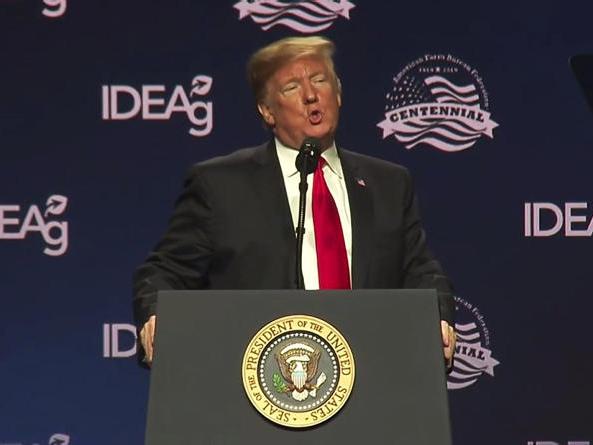Back in the late 18th century, Scottish economist Adam Smith explained the concept of the ‘invisble hand’ and allowing markets and trade to self regulate. Smith argued that open competition leads to economic prosperity. In Washington DC we encountered American farmers as they called for ‘trade not aid’ and voiced their complaints about the lack of access to the EU market.
American farmers account for 1% of the population, with just over 2m farms and an average farm size of 443 acres.
The family farm is still a key symbol of American rural life, with 95% of farms family-owned and operated. The number of farmers continues to decline despite average farm size growing.
American agriculture is currently in the midst of a five year low price cycle. In 2018 alone, 3,000 dairy farmers exited the sector due to continued financial losses and insolvency.
There are now just fewer than 38,000 dairy farmers in the US with 9.3m dairy cows
The states recording the highest loss of dairy farmers were Wisconsin, Pennsylvania, New York, Michigan and Ohio.
There are now just fewer than 38,000 dairy farmers in the US with 9.3m dairy cows. Milk production is consistently running 1% ahead of consumption with the resulting downward pressure on price.
The National Milk Producers Dairy Federation told the ASA that the industry would like to open EU markets to US dairy produce. The Federation has supported the call for a ban on the importation of certain Irish dairy produce.
With America engaged in its combative trade strategy toward China, the initial promise was that short term pain inflicted on farmers would be worth the long term gain for producers.
A tweet by Donald Trump announcing further tariffs on Chinese goods cost one soya bean producer (500 acres) $40,000
American soya bean farmers have been seriously impacted by the trade dispute with China, who was the largest buyer of American soya beans until recently.
A tweet by Donald Trump announcing further tariffs on Chinese goods cost one soya bean producer (500 acres) $40,000 due to the resulting drop in soybean price.
Senator Pat Roberts, Agricultural Chair of the Senate, said while the current US administration favours tariffs, they are counter productive and resemble ‘shattered glass’.
Once the glass is shattered, the splinters travel far and wide with no control or future visibility of the implications, he added.
The Senator said that American farmers want ‘freedom to farm’ with ‘words meaning everything’ and the national desire for trade not aid.
Sharon Bomer, Office of the United States Trade Representative (USTR) for agriculture highlighted the divergence of opinions between the US and EU definition of science, technology and market access.
She said that the USTR seek to solve problems based on science and that risk should be measured through hazard by exposure rather than just hazard.
With over 75% of US pork exports previously exported to China, this product now needs a new market
This, she claimed, is very different to the EU interpretation of risk, with particular relevance to the EU view on anti-microbial resistance, which USTR has an opposing view of.
The North American Meat Institute (NAMI) further endorsed the US demands for greater access to the EU market. With over 75% of US pork exports previously exported to China, this product now needs a new market.
China’s trade tariffs coupled with rampant African Swine Fever, and the resulting sow culling are a major cause of concern for the US pig industry.
Jason Hafemeister, trade counsel at the US Department of Agriculture (USDA) described EU/US trade relations as ‘poor’ with considerable US frustration at the lack of access to EU markets for their growers and processors.
This is certainly high on the agenda of many of the policy makers on Capitol Hill and poses the question of how the legislators will challenge back?
Hafemeister detailed the perceived ‘regulatory mismatch’ and ‘cultural challenges’ preventing increased access to EU markets.
When asked about climate change, Hafemeister said that while the industry needs to find suitable mitigation solutions to rising temperatures, he believed there should not be any ‘sacrifice or suffering’ on the part of the producer.






 This is a subscriber-only article
This is a subscriber-only article









SHARING OPTIONS: